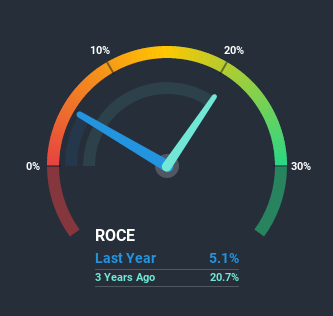Should You Be Impressed By Jing-Jan Retail Business' (GTSM:2942) Returns on Capital?
What trends should we look for it we want to identify stocks that can multiply in value over the long term? In a perfect world, we'd like to see a company investing more capital into its business and ideally the returns earned from that capital are also increasing. Put simply, these types of businesses are compounding machines, meaning they are continually reinvesting their earnings at ever-higher rates of return. However, after investigating Jing-Jan Retail Business (GTSM:2942), we don't think it's current trends fit the mold of a multi-bagger.
Understanding Return On Capital Employed (ROCE)
Just to clarify if you're unsure, ROCE is a metric for evaluating how much pre-tax income (in percentage terms) a company earns on the capital invested in its business. Analysts use this formula to calculate it for Jing-Jan Retail Business:
Return on Capital Employed = Earnings Before Interest and Tax (EBIT) ÷ (Total Assets - Current Liabilities)
0.051 = NT$245m ÷ (NT$6.2b - NT$1.4b) (Based on the trailing twelve months to June 2020).
So, Jing-Jan Retail Business has an ROCE of 5.1%. Even though it's in line with the industry average of 5.1%, it's still a low return by itself.
Check out our latest analysis for Jing-Jan Retail Business

Historical performance is a great place to start when researching a stock so above you can see the gauge for Jing-Jan Retail Business' ROCE against it's prior returns. If you want to delve into the historical earnings, revenue and cash flow of Jing-Jan Retail Business, check out these free graphs here.
How Are Returns Trending?
In terms of Jing-Jan Retail Business' historical ROCE movements, the trend isn't fantastic. Around five years ago the returns on capital were 15%, but since then they've fallen to 5.1%. Meanwhile, the business is utilizing more capital but this hasn't moved the needle much in terms of sales in the past 12 months, so this could reflect longer term investments. It's worth keeping an eye on the company's earnings from here on to see if these investments do end up contributing to the bottom line.
On a related note, Jing-Jan Retail Business has decreased its current liabilities to 22% of total assets. So we could link some of this to the decrease in ROCE. Effectively this means their suppliers or short-term creditors are funding less of the business, which reduces some elements of risk. Since the business is basically funding more of its operations with it's own money, you could argue this has made the business less efficient at generating ROCE.The Key Takeaway
To conclude, we've found that Jing-Jan Retail Business is reinvesting in the business, but returns have been falling. Additionally, the stock's total return to shareholders over the last year has been flat, which isn't too surprising. All in all, the inherent trends aren't typical of multi-baggers, so if that's what you're after, we think you might have more luck elsewhere.
If you'd like to know more about Jing-Jan Retail Business, we've spotted 3 warning signs, and 1 of them makes us a bit uncomfortable.
If you want to search for solid companies with great earnings, check out this free list of companies with good balance sheets and impressive returns on equity.
If you decide to trade Jing-Jan Retail Business, use the lowest-cost* platform that is rated #1 Overall by Barron’s, Interactive Brokers. Trade stocks, options, futures, forex, bonds and funds on 135 markets, all from a single integrated account. Promoted
New: Manage All Your Stock Portfolios in One Place
We've created the ultimate portfolio companion for stock investors, and it's free.
• Connect an unlimited number of Portfolios and see your total in one currency
• Be alerted to new Warning Signs or Risks via email or mobile
• Track the Fair Value of your stocks
This article by Simply Wall St is general in nature. It does not constitute a recommendation to buy or sell any stock, and does not take account of your objectives, or your financial situation. We aim to bring you long-term focused analysis driven by fundamental data. Note that our analysis may not factor in the latest price-sensitive company announcements or qualitative material. Simply Wall St has no position in any stocks mentioned.
*Interactive Brokers Rated Lowest Cost Broker by StockBrokers.com Annual Online Review 2020
Have feedback on this article? Concerned about the content? Get in touch with us directly. Alternatively, email editorial-team@simplywallst.com.
About TPEX:2942
Good value with mediocre balance sheet.
Market Insights
Community Narratives



